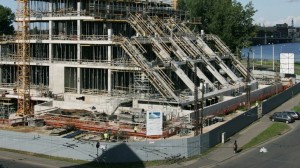Latvia has had its share of joy and sorrow, success and failure, hope and disappointment. In one of Latvia’s most treasured legends a White Knight battles a Black Knight and both plunge into the River Daugava during their struggle. Legend has it that the White Knight, Lacplesis, will someday rise again, bringing with him the Castle of Light.
Latvia’s new national library, under construction on the left bank of the river Daugava has been called a Castle of Light, both because of its design and deep symbolism. For Latvians, light means knowledge, energy and awareness, all qualities that are embodied in the idea and functions of a library. But this library will be more than a building that houses books and archives. It will be the center of a computerized network of knowledge for all of Latvia. Known as “Lightnet”, this virtual super library will span the length and breadth of Latvia and link approximately 2,000 libraries, making their combined data bases, resources and over 6,5 million units available to everyone.
Some question the wisdom of undertaking such a project during a time of economic crisis. Others believe that investing in the education, enlightenment and skills of our future generations is the wisest thing you can do. While governments must rally all their forces to solve the problems of today, they must also plan for the future.
Short-term solutions bring short-lived results. That’s something we have learned over the last 18 years of independence. Latvia experienced explosive growth when it joined the European Union and NATO in 2004, but this abundance of sudden wealth and opportunity proved beyond our capacity to handle. Now we must rethink, retool, revise and revamp.
We aren’t alone in suffering the consequences of an over-heated economy in a time of global crisis, just as during World War II, we weren’t alone in suffering the devastating effects of war, invasion and occupation. Then, as now, Latvia got the worst of it. We lost over 600,000 people — one-third of our population — because of the war. Many thought we would never recover.
Twenty years ago, Latvia was still under Soviet occupation and many thought we would never recover from that either. But on Aug. 23 last year Latvia marked the 20th anniversary of a remarkable event that led to the restoration of our independence two years later. That was the day that over 2 million Latvians, Lithuanians and Estonians joined hands to form a 600 kilometre human chain from Tallinn to Riga to Vilnius. It was called “The Baltic Way”, and it too symbolized our capacity to rise up against adversity. We made history then, and the event has been submitted for entry in the UNESCO Memory of the World Register.
It also symbolized something else. Many historians believe that the Baltic “singing revolutions” of the late 1980s not only led to our independence, but also helped bring down the Soviet empire. Just as the White Knight brought the Black Knight down with him in his struggle for freedom.
In the legend, the White Knight Lacplesis disappeared into the Daugava, but his people survived, strengthened by the hope that he would rise again.
We have been written off by others throughout our history. Sometimes we have even doubted ourselves and wondered whether we can withstand one more war, one more setback, one more economic crash. And yet, the mere fact that we are still here after three thousand years proves that we have always been able to rise to the challenge, and not only survive, but thrive.
The Castle of Light that is rising on the Daugava will not solve our economic problems, nor will it worsen them. But it is a reassuring sign that we still have faith in ourselves and our future.
Ojārs Kalniņš is the director of the Latvian Institute. The Latvian Institute (Latvijas institūts) was established by the Latvian state to provide a wide range of information about Latvia, its society, culture and history. For more information visit www.li.lv.
Disclaimer:
Views expressed in the opinion section are never those of the Baltic Reports company or the website’s editorial team as a whole, but merely those of the individual writer.













